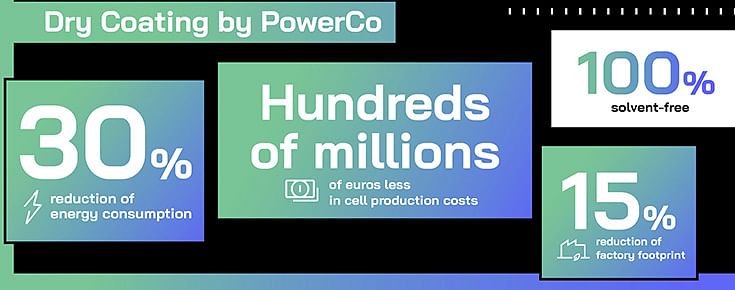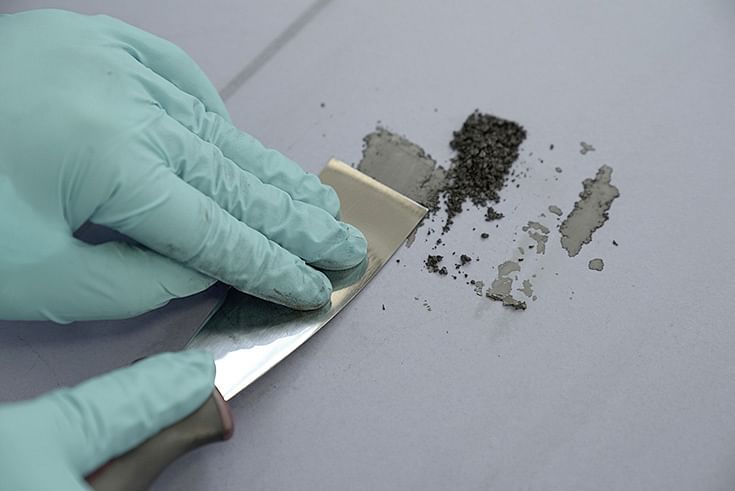Volkswagen’s battery division develops pathbreaking technology for cell production
Dry coating of battery cells claimed to save about 30 percent energy, 15 percent floor space required and millions of euros in production costs
PowerCo, the battery subsidiary of the Volkswagen Group, plan to introduce a completely new manufacturing process in its battery cell production plants in Europe and Northern America. The new technology will significantly boost efficiency and sustainability in volume battery cell production.
Based in Salzgitter, Niedersachsen, the battery company aims to industrialise the so-called ‘Dry Coating’ procedure. The technology allows a decrease in energy consumption of about 30 percent, internal tests have already proven successful. Together with German printing machine specialist Koenig & Bauer AG, PowerCo will further develop and industrialize the Dry Coating procedure.
Thomas Schmall, Group Board Member for Technology at Volkswagen AG and Chairman of PowerCo, said: “Technologies like Dry Coating showcase PowerCo’s technological prowess. We have the necessary know-how and the right experts to take cell production to a new level and offer significant cost advantages to our customers. Our objective is to establish an industrial production of sustainable and affordable batteries.”

Potential for huge savings
PowerCo and Koenig & Bauer are to develop a roller press for powder coating electrodes at large industrial scale. The Dry Coating procedure allows manufacturing electrodes without wet-coating and subsequently drying them at high costs.
With the new procedure, the most energy-intensive part of cell manufacturing and the use of chemical solvents are no longer required. PowerCo is already testing and optimizing the technology in a pilot line in one of its laboratories in Northern Germany. As a printing specialist, Koenig & Bauer will develop a machine for the industrial powder coating.
According to PowerCo estimates, the new technology has the potential of saving about 30 percent of energy as well as 15 percent of floor space required and will therefore save hundreds of millions of Euros each year. Frank Blome, CEO of PowerCo SE: “What the solid-state cell is to the product, Dry Coating is to production – a real game changer. If scaled successfully, it will give us a unique position on the market and definite competitive advantages.”

Powder instead of slurry
The electrodes (cathode and anode) are the ‘centrepiece’ of the battery cell defining energy density and battery performance. In modern industrial electrode production, the battery materials are mixed with additives and liquid solvents to a slurry. Afterwards, they are coated onto foils of copper or aluminum, then dried and calendered.
PowerCo’s Dry Coating procedure allows to calender the powdery basic materials directly onto the foil, similar to a printing procedure. As a result, two of four process steps in electrode manufacturing become obsolete. The powder coating can be applied onto the foil in an extremely fine and even manner, the resulting layer is about as thin as a hair. This guarantees excellent spatial energy density and a long life cycle, while improving the fast-charging ability of the battery.
Breakthrough for green batteries
The new technology reduces floor space required by 15 percent – an enormous saving potential. Per building block of a regular Gigafactory with a production capacity of 20 GWh, four parallel coating and drying lines can be saved, equaling an area of 7.000 square metres. As a result, the exterior length of the plant can be reduced by about 100 metres. Not having to operate the energy-intensive drying furnaces and suction systems will save energy equivalent to the annual consumption of 40,000 private households.
Furthermore, the use of chemical solvents that have to be laboriously recycled at high energy costs in silo-like towers outside the plants is no longer necessary.
RELATED ARTICLES
Autoliv Plans JV for Advanced Safety Electronics With China’s HSAE
The new joint venture, which is to be located strategically near Shanghai and close to several existing Autoliv sites in...
JLR to Restart Production Over a Month After September Hacking
Manufacturing operations at the Tata Group-owned British luxury car and SUV manufacturer were shut down following a cybe...
BYD UK Sales Jump 880% in September to 11,271 units
Sales record sets the UK apart as the largest international market for BYD outside of China for the first time. The Seal...






 By Autocar Professional Bureau
By Autocar Professional Bureau
 16 Jun 2023
16 Jun 2023
 5155 Views
5155 Views












 Ajit Dalvi
Ajit Dalvi




